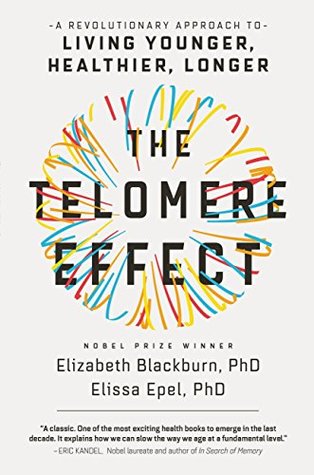Shaun's Reviews > The Telomere Effect: A Revolutionary Approach to Living Younger, Healthier, Longer
The Telomere Effect: A Revolutionary Approach to Living Younger, Healthier, Longer
by

by

I'm surprised by some of the negative reviews here.
I will admit that the book is repetitive at times, and it does seem as if the impact of stress on telomere length gets more air time than it deserves, but I chalked this up to one of the two authors having a specialty in the field of psychology.
I also can understand why the conclusions are described by some reviewers as anticlimactic. Once again, we're being told to exercise, eat whole foods, get adequate sleep and destress. Ah, duh.
But, I think the strength of this book and the research is that while we've long accepted that exercise, eating whole foods, sleeping and destressing are good for us, we are only now starting to explore and understand the underlying physiologic reasons why. And anything that deepens our understanding is useful. I honestly don't know what people expect when they read a book like this? To learn that exercise, whole foods, sleep and stress management aren't good for us after all? Or maybe they are hoping for a magic pill...which is kind of the point. Magic pills don't exist.
Interestingly, despite an every-growing multibillion dollar health and wellness industry we've never been sicker or fatter, which may be in part due to the fact that the emphasis (sometimes misguided and sometimes on point) has been primarily on food and exercise. The role of sleep and stress is mentioned but almost as an aside. Yet books like this suggest that the latter as important, maybe even more important, and the telomere effect may be one explanation why.
In a nutshell, telomeres are a noncoding form of DNA that protects our chromosomes (the DNA/genes in our cells). Over time, the telomeres shorten to a point where they can no longer do their job. The result is cellular death and ultimately aging and disease. Research has identified various factors that impact telomere length. A large part of the discussion focuses on stress.
In the end, the research on telomeres only further strengthens what we already know: exercise, whole foods, sleep and stress management are all good for us. Surprise, surprise. But more importantly, it deepens our understanding of why those recommendations are valid and important.
I will admit that the book is repetitive at times, and it does seem as if the impact of stress on telomere length gets more air time than it deserves, but I chalked this up to one of the two authors having a specialty in the field of psychology.
I also can understand why the conclusions are described by some reviewers as anticlimactic. Once again, we're being told to exercise, eat whole foods, get adequate sleep and destress. Ah, duh.
But, I think the strength of this book and the research is that while we've long accepted that exercise, eating whole foods, sleeping and destressing are good for us, we are only now starting to explore and understand the underlying physiologic reasons why. And anything that deepens our understanding is useful. I honestly don't know what people expect when they read a book like this? To learn that exercise, whole foods, sleep and stress management aren't good for us after all? Or maybe they are hoping for a magic pill...which is kind of the point. Magic pills don't exist.
Interestingly, despite an every-growing multibillion dollar health and wellness industry we've never been sicker or fatter, which may be in part due to the fact that the emphasis (sometimes misguided and sometimes on point) has been primarily on food and exercise. The role of sleep and stress is mentioned but almost as an aside. Yet books like this suggest that the latter as important, maybe even more important, and the telomere effect may be one explanation why.
In a nutshell, telomeres are a noncoding form of DNA that protects our chromosomes (the DNA/genes in our cells). Over time, the telomeres shorten to a point where they can no longer do their job. The result is cellular death and ultimately aging and disease. Research has identified various factors that impact telomere length. A large part of the discussion focuses on stress.
In the end, the research on telomeres only further strengthens what we already know: exercise, whole foods, sleep and stress management are all good for us. Surprise, surprise. But more importantly, it deepens our understanding of why those recommendations are valid and important.
Sign into Goodreads to see if any of your friends have read
The Telomere Effect.
Sign In »
Reading Progress
November 20, 2019
–
Started Reading
November 20, 2019
– Shelved
November 30, 2019
– Shelved as:
health-coaching
November 30, 2019
– Shelved as:
non-fiction
November 30, 2019
– Shelved as:
read-2019
November 30, 2019
–
Finished Reading


